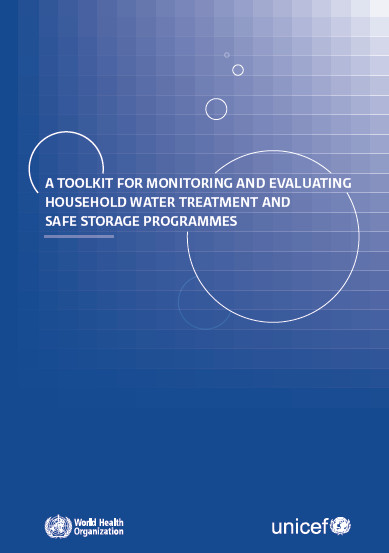Toolkit for monitoring and evaluating household water treatment and safe storage
 |
guide Oct 2012 ; 62 pages
Ed. UNICEF - New York WHO - Genève ; Isbn: 978 92 4 150462 1
Téléchargeable sous format: PdF
Téléchargeable chez l'éditeur
Page de présentation d'un éditeur
Abstract:
In order to develop effective mechanisms to encourage and sustain correct use of household water treatment and safe storage (HWTS), there is a need to monitor and evaluate uptake. To date, there has been a lack of harmonized relevant tools and indicators to assist in the monitoring and evaluation (M&E) of HWTS programmes. This document is intended to address this need.The Toolkit provides an overall framework for planning, conducting, and utilizing monitoring and evaluation data to improve programme outcomes.
One of the key features of the Toolkit is the presentation, for the first time, of 20 harmonized, global indicators to assess correct and consistent use of household water treatment and safe storage by those most at risk. These indicators build upon previous efforts among HWTS stakeholders and are grouped according to the following themes:
- reported and observed use;
- correct, consistent use and storage;
- knowledge and behaviour;
- other environmental health interventions;
- water quality.
A decision-tree is presented to assist in the selection of indicators based on programme aims and resources. The Toolkit also provides sample surveys, examples of from the field, information on water quality sampling, and resources for additional information. The WHO/UNICEF International Network on Household Water Treatment and Safe Storage will be working on dissemination of the Toolkit and developing means to more easily share data in order to improve programme implementation and increase health gains from use of HWTS.
Mots clefs: |
eau potable (CI) (DT) (OP) (ope) , potabilisation (CI) (DT) (OP) (ope) , qualité des eaux (CI) (DT) (OP) (ope) , santé (CI) (DT) (OP) (ope) , sécurité (CI) (DT) (OP) (ope) |
Editeurs/Diffuseurs: |
|
UNICEF - New York - Etats Unis |
WHO
-
World Health Organization - Genève - Suisse |
En cas de lien brisé, nous le mentionner à communication@pseau.org